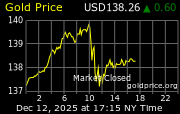Combat the sovereign debt crisis, investors bid up the price of gold
 The gold price was pressured last week by widespread weakness in commodities as uncertainty over the European sovereign debt crisis cast a pall over financial markets. Euro zone finance ministers began a six-day meeting on Friday in the hopes of developing a more robust plan to combat the escalating crisis. Leveraging up the European Financial Stability Fund (EFSF) to as high as €2 trillion has been a topic of considerable debate, but no concrete plan has yet to be agreed upon.
The gold price was pressured last week by widespread weakness in commodities as uncertainty over the European sovereign debt crisis cast a pall over financial markets. Euro zone finance ministers began a six-day meeting on Friday in the hopes of developing a more robust plan to combat the escalating crisis. Leveraging up the European Financial Stability Fund (EFSF) to as high as €2 trillion has been a topic of considerable debate, but no concrete plan has yet to be agreed upon.Grant concluded by saying that “Europe has now run out of road. There is no compromise that is politically acceptable. Whatever choices are left are ones that are either politically or economically painful and perhaps impossible. Whatever gets done is going to be nowhere near what some in the marketplace have hoped for or bet on. Europe has reached the wall.”
The implications of Grant’s predictions for the gold price are quite unclear, particularly in the short term. In the absence of a leveraged EFSF, Greece is almost certain to default, and several other PIIGS may not be far behind. Such a scenario would likely lead to substantial and widespread liquidation in financial markets – where investors are forced to sell any and all asset classes to raise cash – which could present a significant headwind for the gold price.
However, further turmoil in Europe could also have grave consequences for the euro currency and thus add to the wave of declining confidence in fiat currencies across the globe. Furthermore, the risk of deflation in many developed and emerging economies would likely increase in this scenario, thereby provoking central banks to implement a slew of additional accommodative monetary policies in efforts to resuscitate their respective economies. In such an environment, the gold price would likely be a prime beneficiary.
The gold price climbed higher Monday, rising back above the $1,650 per ounce level. Despite the fact that European leaders decided at this past weekend’s summit in Belgium not to use the European Central Bank’s balance sheet more aggressively to combat the sovereign debt crisis, investors bid up the price of gold anyways. Gold prices have been mired in a correction as debate rages over whether the current deflation scare is in the process of sending the global economy into a new recession.













0 comments:
Post a Comment